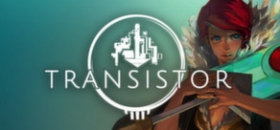
Transistor Review
'Hey Red, we're not going to get away with this, are we?'
The first words your sword speaks to you at the apparent scene of a brutal murder. A hard hitting intro with no fanfare, menu or introduction. What we've got here is a game with the grit and attitude to throw you in media res - into the middle of the action, bewildered and non-plussed (in a good way) just like your silent protagonist.

Transistor belies its generic name by being anything but run-of-the-mill; it's an action game with turn-based combat: a combination that, before you get into it, will cause you to take a step back and ask of developer SuperGiant games, 'Will they get away with it??'. Initially the two modes seem to be at odds with each other but trust me when I say it works. But of course, you'll want to know how it works. Different skills or Functions are collected as you progress and can be assigned to different button presses, allowing you to lay down heavy vertical strikes or area-of-effect explosions, summon allies, turn enemies or bounce projectiles around the fight area. While you have all this violence at your disposal, it's just not enough because the action is too fast and the damage mete out too heavy for you to survive alone, forcing you to engage the turn-based element. With a push of the trigger you freeze time, allowing you to spend portions of an action bar on creating the most efficient killing pattern: line up slashes to take out rows of opponents; move AOE explosions to hit as many enemies as possible and reposition your character to get in high damage backstabs. Press the action key and your character Red will carry out her swathe of killing in a righteous fury. Once this has been performed however, you are unable to attack while your action bar fills up, forcing you to manoeuvre and hide; creating combat sequences of back-and-forth, catting-and-mousing. Satisfying and varied.
There's more to it than that though. Functions aren't just used as attack moves - at stations, not only can you assign an attack function to a button but it can also be assigned to upgrade slots to enhance other moves, or passive slots to benefit your character. Thus an explosive type move can also be attached as an upgrade to give your sword strikes a radius blast, or in the passive slot to summon explosives at random onto the field of play. The game encourages you to mix-and-match, experimenting with different function combos to create totally different fighting styles. In addition to this, losing a life bar breaks one of your Functions, taking it out of the game for a few fights - this is a stroke of genius on Supergiant's part, simultaneously making it so that death as a mechanic really matters while forcing you to constantly alternate your loadout.

'Together again. Heh. Sort of.'
Varied attack loadouts; selectable modifiers designed to make the game harder while netting you extra XP; a beautiful but empty world: you can see Transistor's heritage easily and it is quite clearly from the same team that brought you the critically acclaimed Bastion. You even have the famed constant voiceover narrating your every move, but where in Bastion you had the Southern drawl here you have the same voice actor (Logan Cuningham) going for the gravely quips of a Hardboiled Film Noir detective; where before you had a world firmly rooted in fantasy here you have sci-fi film noir with lots of anime influences: think the environs of Blade Runner with the stylised characters of Final Fantasy. These comparisons however don't really do it justice as it stands confidently on its own. The game is gorgeous, the environments brightly coloured and richly detailed with a stellar soundtrack and amazing (if minimal) voice cast. However, as I found with Bastion, the empty environments and constant one-man narration grates as you draw close to the end. It gets a bit depressing, monotonous, lonely and not in an atmospheric way.

'Nice. Ok, let's go.'
Transistor is a short game which is for the best as it starts to say goodbye just as things verge on overstaying their welcome but for those who worry about value for money there are challenge modes (speed trials, efficiency trials where you get a limited number of moves to wipe out the enemy and a wave survival mode) and a NG+ to keep you going back.
Transistor (Reviewed on Windows)
This game is great, with minimal or no negatives.
Beautiful, stylised and interesting. In a world of stale games Transistor takes all that was good from the loved Bastion but makes enough changes that it stand out on its own.












COMMENTS